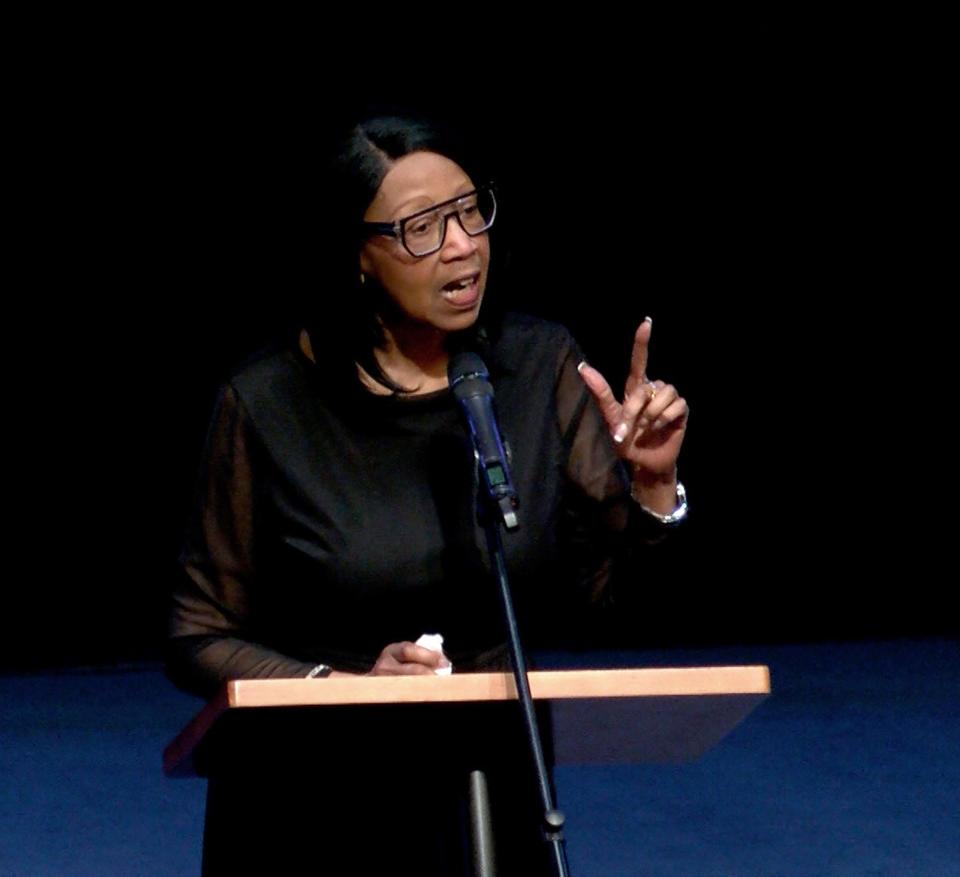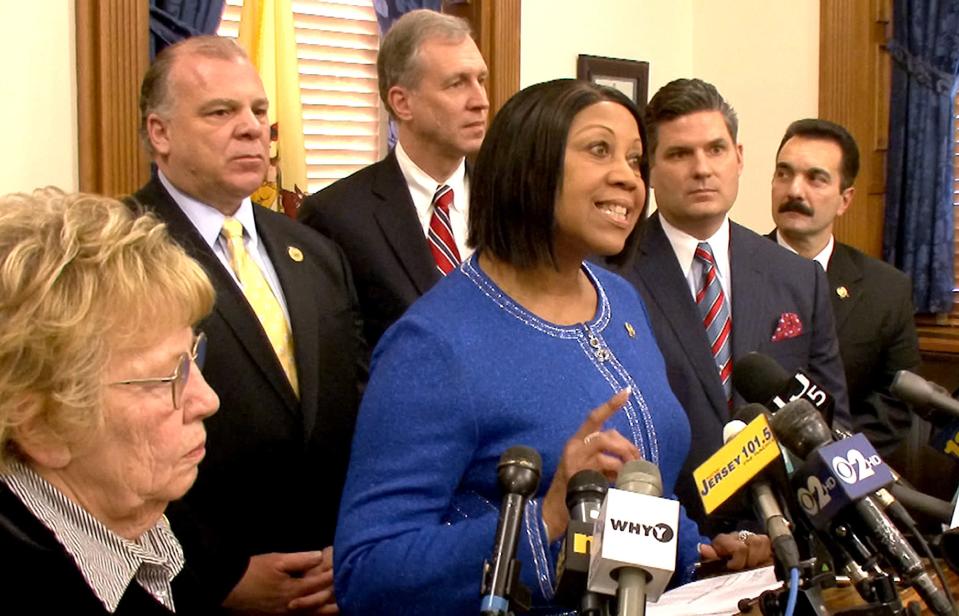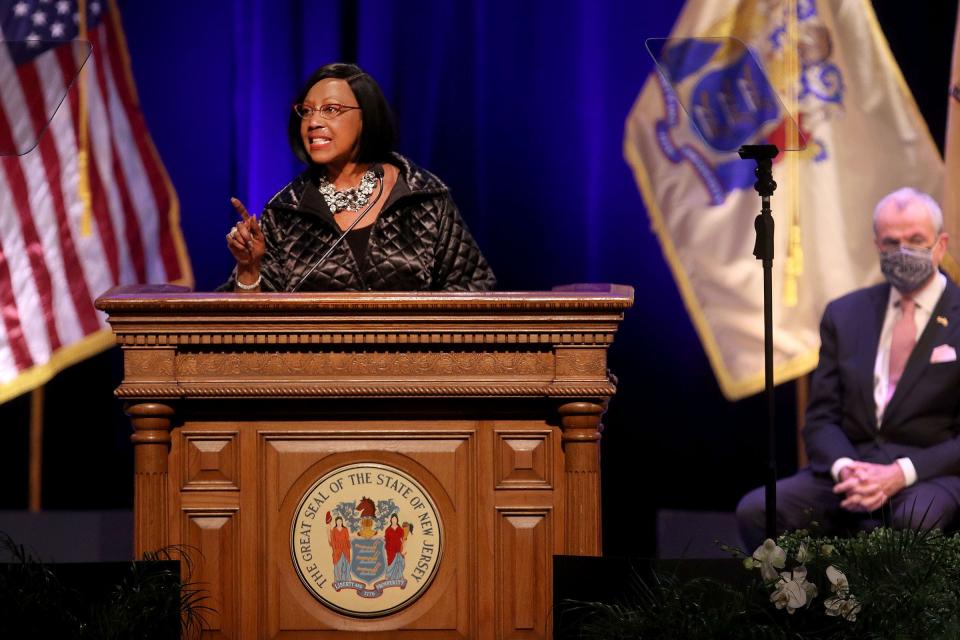Sheila Oliver navigated Trenton's waters — and thrived. We can learn from her: Stile
- Oops!Something went wrong.Please try again later.
- Oops!Something went wrong.Please try again later.
- Oops!Something went wrong.Please try again later.
- Oops!Something went wrong.Please try again later.
- Oops!Something went wrong.Please try again later.
Sheila Oliver stepped into history in 2010 — and straight into a political buzz saw.
The social activist-turned-ambitious lawmaker found herself as the 169th speaker of the General Assembly, the first Black woman to hold the third-highest post in New Jersey politics. Oliver, who died Aug. 1 at the age of 71, was largely unknown in Trenton.
And untested.
Her ascendancy came at the same time that a brash, ambitious Republican Gov. Chris Christie stormed the Statehouse, upending decorum and political norms and capturing the attention of Republican leaders across the country.

Christie found a frequent ally in state Senate President Stephen Sweeney, a moderate South Jersey Democrat. The two formed an axis of accommodation, the ultimate boys' club of power, backed by party bosses like George Norcross, the Camden County Democrat then at the zenith of his statewide power.
Oliver, whose funeral Saturday at the Cathedral Basilica of the Sacred Heart in Newark is expected to draw political figures from across the spectrum, often found herself on the outside looking in. And to many of the veteran cognoscenti in Trenton — the predominantly white lawmakers, operatives and lobbyists who knew how to make alliances and deals — Oliver seemed like a deer caught in the headlights.
They underestimated her.
“I think for one, she was a woman, and two, because she was an African American, I think there was a feeling that she was weak and very vulnerable," said Bishop Reginald T. Jackson of the African Methodist Episcopal Church in Atlanta, and a former executive director of the Black Ministers Council of New Jersey.
“But Sheila stood her ground," said Jackson, who became a trusted adviser to Oliver during her stint as speaker. “They found out that she indeed was a very strong woman. And to her credit, she had principles."
Charlie Stile: Gov. Phil Murphy, back in New Jersey, mourns his 'greatest partner,' Sheila Oliver
Obituary: Sheila Oliver, NJ lieutenant governor, dies at age 71
At turns flinty, patient and self-confident, Oliver was not accustomed to the get-along, go-along ethos of the Statehouse. But the Oliver that did emerge was Sheila, the Newark and East Orange social justice warrior who wielded patience and persistence she developed in her pre-legislative career as one of the founders of the Newark Coalition for Low Income Housing.
The organization successfully blocked the demolition of all publicly subsidized low-income housing in Newark after suing the Newark Housing Authority and the U.S. Department of Housing and Urban Development. Oliver later entered elective politics to improve the lives of underprivileged people, and she intended to make that a priority — even if it meant colliding with the Christie-Sweeney axis of power.
Debbie Walsh, the director of the Center for American Women in Politics at Rutgers University, said Oliver followed the maxim of former Sen. Barbara Mikulski, the Maryland Democrat who was a former social worker.
Mikulski "had a line that politics is social work with power," said Walsh, who got to know Oliver over the years as a frequent speaker at CAWP’s annual “Ready to Run” training sessions for aspiring women candidates. “And I think Sheila really operated on that level that she had. Her purpose was to help people ... and she saw politics and being in elective office and public service in that way, as a way to have a real reach.”
A power broker among power brokers
Oliver, who rose through the ranks of East Orange and Essex County politics, was elected to the state Assembly in 2003. But her elevation to the top spot came as part of a regional deal brokered with the South Jersey Democrats, who, under Norcross' leadership, sought to oust former Gov. Richard J. Codey of Essex County from the state Senate presidency to make way for Sweeney.
North Jersey leaders agreed to provide the votes for Sweeney in exchange for someone in North Jersey as Assembly speaker, thus providing a regional balance. Oliver became the consensus choice, backed by Essex County Executive Joseph N. DiVincenzo Jr., who at the time was allied with Norcross. (Oliver was also on DiVincenzo’s payroll as an assistant Essex County administrator.)

At Christie’s inauguration in January 2010, he surprised the audience by summoning both Sweeney and Oliver up to the lectern, gripping and raising their hands in a pledge of bipartisan cooperation.
And, for a while, it seemed Christie achieved the cooperation he sought, especially from Sweeney, who shared some of Christie’s cost-cutting goals. Their biggest test, though, came when Christie, with Sweeney’s help, advanced a sweeping rollback of public employee pension and health benefits.
Oliver, however, initially chafed at the plan. It was highly unpopular with the public employee unions, a core Democratic constituency whose leaders forged deep ties to Assembly Democrats under her control.
Some experienced Statehouse aides also chafed at Oliver’s strategic style. At one point, Bill Caruso, executive director of the Assembly Democrats, voiced concern that no one from her office was participating in one round of discussions between Christie and Sweeney’s office.
“'Oh, they're all playing down the hall and we're not there. Is that what you’re saying to me?'“ Caruso remembered Oliver saying. “And she was kind of mocking me.”
She eventually took Caruso’s advice and dispatched him to the meeting. But Caruso said he then realized Oliver was not an in-over-her-head neophyte but was demonstrating patience under pressure. She was seeking leverage.
“‘Bill, our caucus is not ready right now. I’m not ready, and they can go talk about whatever they want. When the speaker's ready. I'll let them know,’" Caruso recalled Oliver saying.
“My whole attitude changed about her," he said.
Oliver eventually marshaled the votes after extracting some concessions from Christie and Sweeney that softened the blow of the overhaul. To her allies, Oliver, the former social activist and veteran of Essex County politics, had stood her ground, refusing to be a rubber stamp.
But it came at a cost. It was an anxious time for public labor unions. In Wisconsin, right-wing Gov. Scott Walker had drawn national attention by pushing through laws that dismantled the collective bargaining rights of his state workers, sending shock waves around the country.
It was seen as a turning point in the struggle of organized labor, and the Christie-led effort in New Jersey was seen as part of an ominous, anti-union wave sweeping the country. One Saturday, more than 30,000 unionized workers flooded into Trenton in protest.
Discontent with Oliver sparked rumors of a “coup” to replace her. Her opposition to school choice reforms also collided with the aims of Norcross, then the state’s most powerful unelected Democrat, Christie and even her close ally, Jackson, who was then the pastor of a prominent church in Orange.
Yet a concerned Jackson began making calls defending Oliver, and later he attended a meeting with Democratic Party leaders over the issue. At one point there was a proposal in which Oliver would agree not to advance key legislation unless she first got an agreement from the leadership in the room.
“I asked whether the same thing applies to the Senate president," Jackson recalled. “They said no. I said, ‘Well, I don’t think that's anything you should go along with.'"
The coup never materialized — the optics of ousting a historic Black figure from power was a line that few in the Democratic Party were willing to cross. Oliver won support for a second term as speaker in 2011 — after she agreed not to post legislation unless she secured a minimum of 41 votes for passage.
She would go on to use the speaker's perch to defend and advance legislative priorities even as some met with resistance and Christie’s veto. She pushed back on Christie’s repeated cuts to Planned Parenthood funding, only to see that money eventually restored under Gov. Phil Murphy in 2018. She was also one of the early voices to call for restoring the top income tax rate on millionaires.
And she memorably stepped down from the speaker’s lectern in 2011 to deliver an impassioned defense of law legalizing same-sex marriages, which narrowly passed but was struck down by Christie’s veto. (Same-sex couples were allowed to marry legally after the Supreme Court refused to block a lower-court ruling permitting marriages. Murphy signed legislation formally codifying gay marriages in 2022.)
After stepping down from the speaker’s post in 2014, Oliver remained in the Assembly representing the 34th Legislative District in Essex County.
Farewell plans: Memorial service for Lt. Gov. Sheila Oliver to be held next week
A new era of service
Three years later, Murphy, a former Goldman Sachs executive and ambassador to Germany who had never held elective office, sought out a lieutenant governor running mate who was deeply connected to the political establishment, labor and New Jersey’s African American community. Murphy was also running as a progressive and promising a diverse administration.
“I thought to myself, 'I'm new to the state government in New Jersey. Wouldn't it be good to have a partner who not only stood for the right things and with which I had great chemistry, and by the way, she was an icon …especially among young girls and women of color?” Murphy recalled last week.

Murphy also selected Oliver to run the Department of Community Affairs, where she oversaw the administration’s affordable housing policy. She also co-chaired a blue ribbon task force examining the causes of wealth disparity in New Jersey.
But to much of the public, Oliver became the public face of the Murphy administration in the earliest days of the pandemic, when Murphy underwent surgery for kidney cancer.
Oliver’s career marked a time of a historic increase in the number of women elected to the New Jersey Legislature. In 2004, Oliver was among 19 women in the Legislature, marking New Jersey as 43rd in the nation among women representation. Today there are 43 women, and New Jersey’s ranking has climbed to 21st place.
That can be attributed to many factors. And to some extent, Oliver’s advocacy at the Center for American Women in Politics campaign training sessions may have helped. But just being on the job, being present as a Black woman with power, also inspired other women to leap into the fray.
“She never relished the history making. She left that for other people to write," said LeRoy Jones, a former East Orange legislator and now the chairman of the New Jersey Democratic Party. “Her purpose was to do the job she was elected to do.”
Charlie Stile is a veteran New Jersey political columnist. For unlimited access to his unique insights into New Jersey’s political power structure and his powerful watchdog work, please subscribe or activate your digital account today.
Email: stile@northjersey.com
Twitter: @politicalstile
This article originally appeared on NorthJersey.com: Lt. Gov. Sheila Oliver: A legacy of resolve and resilience

